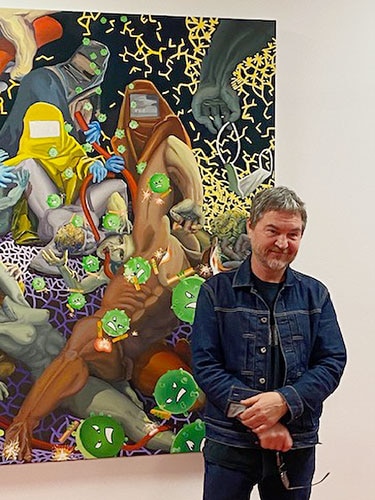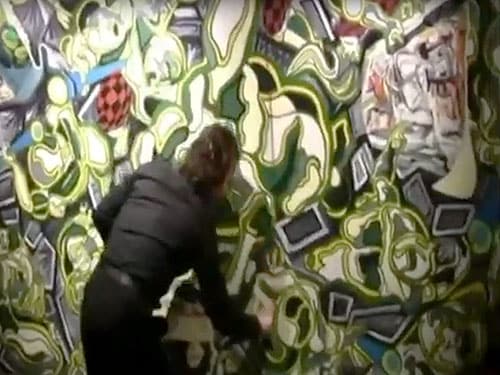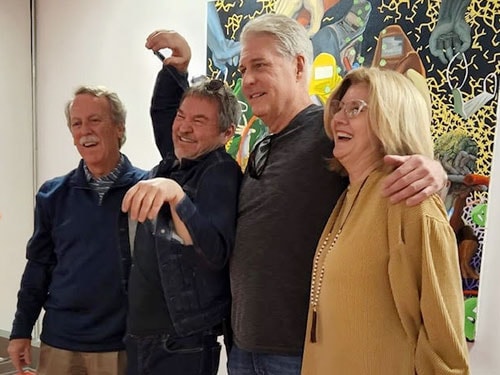Days into our freshman year of medical school at the University of Louisville, all 140 of us were herded into the gross anatomy lab on the top floor of the main building. Rows of florescent lights illuminated a space where we would spend months studying the human body in minute detail. Despite my having spent summers as a nursing assistant and occasionally observing surgery, my anxiety grew as the professor began assigning cadavers. I'd never fainted in my life but the thought was more terrifying than what lay beneath the thick, smudgy plastic in the steel case before me.
Fortunately, I was distracted by the late entrance of a young man dressed in a red muscle shirt and jeans. He walked with the confidence and swagger of a rock star, not the demeanor expected for entering an academic tomb. My best med student friend, Tim, who was his roommate, introduced us. "Melissa, this is Truman."
And thus began a friendship with this charismatic man who I thought, like me, awoke every morning excited about the grand opportunity to become a physician. I skipped happily to class to engage the ultimate academic dream. Truman's smile and initial impression gave no hint of any other aspirations or hidden priorities.

Truman Mays
Because Tim and I were in constant close proximity, Truman would often drift in for a brief standing conversation, never sitting. He brought with him an air of mystery accentuated by the way he cut his eyes sideways when he smiled, as if he knew the location of the holy grail but wasn't telling. If we planned a get-together, he might come or he might not. When he did show up, he was full of fun and mischief. We accepted that he lived his life haphazardly and we took no offense. That was just Truman.
Near the end of our second year, I learned that Truman had worked hard to follow a medical career track, the expectant heir of a Kentucky surgical dynasty. He partied hard but was stone-cold sober when it came to testing and procedures. Fortunately, his DNA for academics carried him. We always looked forward to the postperformance ritual that followed every passing exam. It signified such a sense of deep self-satisfaction when he would fling down his book bag with bravado, mimicking the triumphant removal of a general's cloak after a victorious battle.
I never understood the depth of Truman's dissatisfaction with his prospective career until the day he called to ask for a ride to the library. I parked my yellow Buick LeSabre on Broadway and waited, but he didn't come. Predating cell phones, there was no choice but to walk up the crumbling concrete steps and knock on the door of the old clapboard house he was renting. I turned the knob, found it unlocked, and was hit by the sound of blaring rock music emanating from down the hallway. "Truman! Are you ready?" I yelled, but there was no answer.
A bit uneasy, I walked through his living room, past the African grey parrot perched silently in his large cage, and then by a bedroom door that was open but empty. I walked farther — and even more hesitantly — down the hallway toward a closed door. As I approached the source of the now-deafening music, I feared what I might find. Tentatively I opened the door.
I was taken aback to see Truman standing on a large drop cloth, shirtless, equally immersed in music and sweat. He was feverishly applying swaths of brightly colored paint onto a canvas that covered nearly the entire bedroom wall. In broad, exaggerated motions, he applied splatters of blue, yellow, green, and red that coalesced into a Picassoesque form, the likes of which this Metcalfe County, Kentucky, girl had never seen. My mouth literally fell open as I stood there, hesitating to interrupt such a private moment. Feeling like a voyeur, I awkwardly yelled above the music, "Hey! Truman!"
Truman put down his brush, turned down the music, and walked into the bathroom to grab a shirt. It was obvious that he was disappointed at the interruption. As he got dressed, I canvassed the room and spied an open art magazine atop a paint-spattered wooden stool. My eyes were drawn to the photo of a painting captioned The Polynesian Girls. I think there were three of them, with jet-black hair cropped short and crowned by beautiful leis. Their dark eyes were diverted in a familiar way: Truman's "You'll never know what I'm thinking" look. The submission date and artist name, Truman Mays, were printed below.
I backed away and said nothing because I knew he wouldn't like it if I appeared impressed. He came out of the bathroom, glanced at his painting, and then walked with me to the car. As we drove, his mood was somber, almost sulking. I sensed that he had left behind something he loved far more than medical school.
A few months later I attempted a conversation with Truman about his art, but he was never very forthcoming. He wore the med student persona like a heavy, cumbersome coat, fabricated for survival. But at least I now understood why he would disappear for long periods of time. Truman was painting.
After graduation, time marched quickly. Tim became an ob/gyn, got married, and had a child. My husband and I returned home to Glasgow, Kentucky, where I joined a cardiologist practice. Truman left Louisville to study at the University of California under one of the world's leading trauma surgeons. He got married and raised a couple of kids of whom he would say, "They are the best things I've ever done." He worked as a surgeon part-time in order to pursue his "other interests." He called rarely but occasionally sent long texts with lots of questions, all of which I answered though he rarely answered mine.
A few years after residency, Truman left medicine altogether to become a full-time artist. One day he called out of the blue. "Melissa, if you see my work, please do not 'out' me," he said with a chuckle. "One critic suggested that I paint like a surgeon," he said. His mood was more lighthearted than before. Intrigued, I did a Google search as we spoke. His painting Impadronirsi Immortaliata was featured in the permanent collection at The Flint Institute of Arts in Michigan. He had exhibited at the East Side Art Tour at Flatbed Press in Austin, Texas, 2 years running and participated in group and solo shows in New York, Madrid, and Tokyo.
I was impressed especially when I found his YouTube video:
In that video, he spoke about how he had followed Dadaism, a whimsical, provocative art movement born out of the angst and disappointments of World War I. Truman introduced a piece he had created over months and then defied logic: To the audience's horror, he reached forward with a box cutter and made a quick 4-foot-long incision in his masterpiece, inviting the audience to do the same. He asked them to take their pieces home with them. It made quite the impression.

Truman making an incision in his painting in 2006.
In 2008 his brother died suddenly, something that forever stole a part of Truman's soul. It was a death he would never understand. When I called him after Tim's son was tragically killed in a car accident, he sobbed for Tim's loss but also for his own. Later, he went through a devastating divorce, another life event that, by his own description, "broke" him emotionally. He moved from Texas to Los Angeles and changed his artist name from Truman Marquez to "Call me Horse." He called for the last time in early March of 2022.
"Melissa, I'm bringing a small show to the Moremen Gallery in Louisville," he said. "Come see me." I rounded up the old med-school troops and my husband, and I drove the 90 minutes to Louisville. Truman was both touched and elated. We took photos, told stories, and laughed until we cried for two wonderful hours. For that short time we were the young med-school musketeers again, laughing at the same old jokes, hugging often, and enjoying ourselves as if 30 years had not passed.

From right, Melissa Walton-Shirley, Tim, Truman, and Chuck, another friend from medical school
When it was time to say goodbye, Truman followed us out the gallery door and into the entryway. He hugged each of us as if he never wanted to let us go. After we walked away, we fell silent, basking in the afterglow of an old friendship renewed while aware that those promises to "call soon" were likely empty promises. Tim thought for a moment, "That is the last time we'll ever see him,"
That prophecy came true nearly 1 year later to the day. Truman died in Los Angeles after what was probably an aborted sudden cardiac death. We were told that he made it to the hospital but there was no meaningful potential for recovery. I later learned that when he hugged us goodbye, he was well aware of his cardiac pathology. I'm left to wonder why he didn't pull me aside to tell me or ask my professional opinion. Why didn't he give me an opportunity to help him? Could I have made a difference? Maybe he meant to call at a more appropriate time but put it off until it was too late.
For weeks I engaged in the circular pondering of Truman's life. I considered that perhaps he never should have gone to medical school. He could have endured the break with the family medical tradition when he finished undergrad and pursued his career as an artist years earlier. But then again, if he had not become a surgeon, he wouldn't have built the relationships that culminated in the children he cherished and our friendship. He never would have dissected the human body, a feat that permitted him to incorporate his surgical knowledge into his art. My sleepless nights engaging in varying scenarios were the bargaining phase of grief and a necessary part of acceptance and letting go.
Whether or not things happen for a reason, I'm grateful to have met someone who had the guts to leave the medical profession and pursue their true passion. It was oddly encouraging to witness those snippets of a hard life of privilege shaped by greatness equally balanced by disappointment and pain. Perhaps that pain drove Truman to the darkest recesses of human consciousness where disappointments could be forged into beautiful enduring art.
Truman's persona, like his paintings, was subject to broad interpretation. That was intentional. He once said that his art was "based on a principle of democracy that everyone should have the capacity to share it in such a way that it is deeply moving and personal." Everyone experienced Truman uniquely and it was impossible not to be moved by his enthusiasm. He shared his passion with many who never knew or understood him, but all will continue to be illuminated by the undeniably blazing light of his colorful talent.
Melissa Walton-Shirley, MD, is a native Kentuckian who retired from full-time invasive cardiology. She enjoys locums work in Montana and is a champion of physician rights and patient safety. In addition to opinion writing, she enjoys spending time with her husband and daughters, and sidelines as a backing vocalist for local rock bands. Her Heartfelt column was the 2022 regional gold and national silver Azbee award winner.
Follow Melissa Walton-Shirley on Twitter
Follow theheart.org | Medscape Cardiology on Twitter
Follow Medscape on Facebook, Twitter, Instagram, and YouTube
Credits:
Images: Melissa Walton-Shirley, MD
Video clip: YouTube
© 2023 WebMD, LLC
Any views expressed above are the author's own and do not necessarily reflect the views of WebMD or Medscape.
Cite this: Melissa Walton-Shirley. The Surgeon Who Swapped His Scalpel for a Paintbrush - Medscape - Jul 20, 2023.










Comments